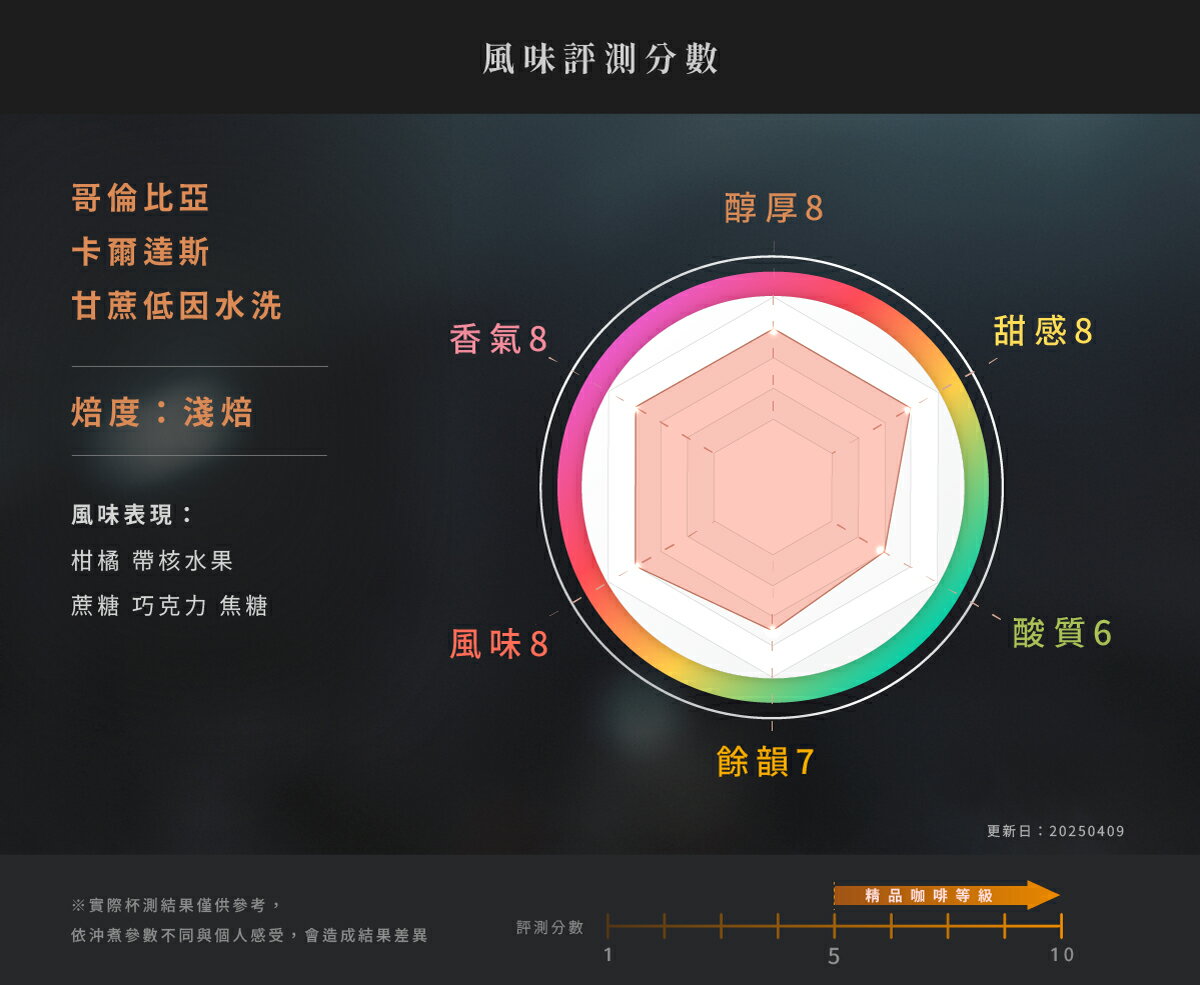

Colombia Caldas Sugarcane DECAF Washed








Coffee Flavor
The flavors of coffee are derived from the breakdown of various nutrients in the green coffee beans during roasting. Heat causes these compounds to degrade into a variety of aromatic molecular structures, resulting in a wide spectrum of flavors. High-quality coffee beans naturally possess a rich aroma that evolves at different temperatures—high, medium, and low—offering a delightful and nuanced experience worth savoring.
Colombia Caldas Sugarcane DECAF Washed
Citrus, Stone fruit, Cane sugar

Colombia boasts abundant coffee production and is currently the world's third-largest coffee producer. Its environment is highly suitable for growing specialty coffee, featuring diverse terrain, low latitude, and high altitude, offering significant potential for specialty coffee. The main production areas for specialty coffee beans are located in the south, with altitudes above 1,500 meters, and numerous volcanoes, creating many well-known specialty regions.
This batch of decaffeinated coffee beans is processed using a natural decaffeination method by Descafecol in Colombia, combining mountain spring water and natural ethyl acetate. Notably, ethyl acetate is a naturally occurring compound found in coffee beans, fruits, and vegetables, meaning the entire process avoids synthetic chemicals.
The ethyl acetate we use is extracted from sugarcane. During the decaffeination process, only two substances come into contact with the coffee beans: mountain spring water and ethyl acetate. This "water-ethyl acetate process" gently removes caffeine without subjecting the beans to excessive heat or pressure, effectively preserving the natural structure and flavor characteristics of the coffee beans. This ensures that the decaffeinated coffee retains its authentic flavor and high quality, without any artificial additives.
Testing has confirmed that this batch of coffee has had over 97% of its caffeine removed. If you are sensitive to caffeine or wish to control your intake, this natural decaffeinated coffee is an excellent choice!

Arabica coffee originates from Ethiopia in Africa. To this day, there are hundreds and thousands of wild coffee species within Ethiopia, many of which grow year-round in pristine forests. These indigenous wild species have undergone countless local evolutions, including hybridization, mutation, and crossbreeding, resulting in a vast gene pool of native varieties known as the Arabica gene pool. The native varieties produced within Ethiopia are referred to as Heirloom (古優原生種).
The coffee tree, botanically classified under the Rubiaceae family and the Coffea subgenus, is an evergreen tree. Coffee beans are the seeds of the coffee fruit. There are three main varieties: Arabica, Robusta, and Liberica. These three varieties cannot crossbreed to produce different subspecies. The world’s specialty coffee comes from the Arabica variety, and within Arabica, there are various subspecies resulting from evolution, hybridization, and mutation.
Caturra
Caturra, the Arabica coffee variety, is a mutant of Bourbon and was first discovered in Brazil. The taste has a sour taste of lemon or citrus, and it has a fruity taste in terms of sweetness. Although the sweetness is not as good as Typica and Bourbon, the sweetness can be very good when properly roasted. The sweetness of Caturra is determined by the number and dosage of fertilizers applied by the grower, and the harvest period takes 2 years, and the cost of care is high, so the yield is still limited.
The Colombia variety
A highly disease-resistant variety bred from the cross between Caturra and Timor Hybrid, it can withstand direct sunlight and has a short harvest cycle. Colombia began widespread cultivation of this variety in the 1980s. Typically, Arabica coffee requires shade trees for protection from the sun, but the Colombia variety—being a hybrid with Robusta lineage—does not need shade and can be harvested year-round.\
Castillo
Castillo is a next-generation, rust-resistant coffee variety developed by the Colombian Coffee Growers Federation (FNC) in collaboration with Colombia’s National Coffee Research Center, Cenicafé. The goal was to enhance the variety for higher yields, greater resistance to diseases, and quality and flavor comparable to Caturra. Today, it is the primary coffee variety cultivated in Colombia.
Castillo inherits Caturra’s compact plant structure and high productivity while also incorporating rust resistance from Timor Hybrid. It is known for its smooth texture, aromatic profile, and bright citric acidity, often characterized by notes of lemon.

(Coffee Processes)
The term "processing methods" refers to the process of transforming ripe red coffee cherries into dried green beans. Each method has its advantages and disadvantages, influenced by the natural environment and the specific needs of the coffee-producing region. As a result, different regions adopt the processing method most suited to their conditions. This batch uses the following Sugarcane DECAF processing methods, described below:
【Sugarcane DECAF】
The green coffee beans are first soaked in warm water to release the caffeine inside. Subsequently, a solution of ethyl acetate extracted from sugarcane is added to further remove approximately 90% of the caffeine. After the decaffeination process, the original caffeine content of the green beans, which was 1.08%, is reduced to about 0.029%, achieving roughly 97% caffeine removal.
During the decaffeination process, only two substances come into contact with the coffee beans: mountain spring water and ethyl acetate. This "water-ethyl acetate process" gently removes caffeine without subjecting the beans to excessive heat or pressure, effectively preserving the natural structure and flavor characteristics of the coffee beans.





JUSTIN INTERNATIONAL FOOD ENTERPRISE CO., LTD.
Tel: +886-3-358-6611
1st Floor, No. 30, Lane 120, Daxing Road, Taoyuan District, Taoyuan City
▶This product is covered by a NT$10 million product liability insurance.
▶Food Industry Registration Number: F-165601955-00000-0
▶ Our company’s cupper is certified as a CQI International Coffee Quality Appraiser.



Recommended Products


※ 詳細出貨及付款說明、發票、海外訂購須知...等,請 點擊進入